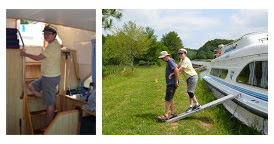I went to Europe for a month and have bounced back into my normal routine at home within a couple of weeks. My therapists say the break from rehab did my body good: My spine looks straighter and, mentally, I'm recharged.
I had anticipated that frequent changes of accommodation would be exhausting.
The time we spent in England changing location every couple nights was tough.
By the end of that week my affected hand had reached its limit and was no
longer able to help stabilize bags that needed stuffing and zipping.
Tip #1: Minimize change of accommodations.
Having anticipated Tip #1, I thought traveling in France by houseboat would be a great idea. Unpack once, and your bedroom goes with you. I was able to maneuver better than I expected around the boat. But it was a confined space and if we moored for the night along a steep bank, I was trapped on the boat. This meant I didn't get much exercise, and by the time we came home, I was very stiff.
 |
| Left: Carrying groceries. Right: With my nieces in Lutzelbourg. |
Using a disability scooter meant less exercise as well, but having it allowed me to participate on bike rides and walks, and to carry my share of luggage and groceries. Ramps and lifts were available everywhere I needed them; European accommodations for the disabled seem to be on par with American standards. The best thing about traveling disabled is the way I zipped through customs and security lines — to the front of the line every time! It's the one thing in my life post-stroke that goes faster than it did before.
